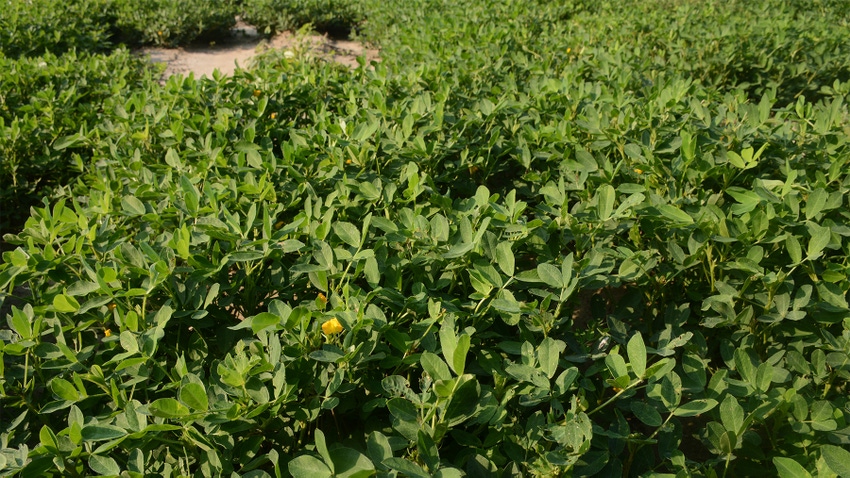
Peanut farmers lost use of Lorsban two years ago to control rootworms. With no other chemical options available, controlling the pest can be a challenge.
So, what can be done?
David Jordan, North Carolina State University Extension peanut specialist, and his colleague Extension Entomologist Rick Brandenburg began examining the application of foliar insecticides to control the adult phase of southern corn rootworm (cucumber beetle or rootworm beetle) to see if damage to pods caused by the worm could be lowered.
Jordan explains that the cucumber beetle generally comes into a peanut field from corn, and it is hard to predict exactly when the peak is, but the peak is usually in late June or early July when the insect comes into a peanut field, lays eggs, and those eggs hatch and the worm then feeds on the pods.
“The idea was, ‘let’s spray in mid to late June and come back two weeks later and then come back again two weeks later than that.’ This approach would blanket that peanut canopy and try to control the adult, hoping you won’t have eggs laid,” Jordan said at a peanut meeting Feb. 21 at the Eastern North Carolina Agriculture and Education Center in Rocky Mount.
Cucumber beetle and rootworms
Research and on-farm testing was conducted at the Upper Coastal Plain Research Station in Rocky Mount, and the Peanut Belt Research Station in Lewiston-Woodville. Findings show farmers can’t control the damage to peanuts from rootworms by applying foliar sprays to control adult cucumber beetles.
“On rare occasion there was less pod damage when insecticide was applied, but in most cases damage in non-treated areas and areas treated with three sprays of insecticide (Steward or Brigade) had the same level of damage,” Jordan said.
“Our recommendation is don’t chase the adult to try to get rootworm control, which means right now we don’t have any chemistries to control rootworms,” Jordan said.
If possible, Jordan said peanut farmers should avoid planting peanuts in poorly drained fields with heavier soils that can be at high risk for rootworms. However, if the heavier natured fields can’t be avoided, Jordan recommends planting your peanuts as early as you reasonably can on these fields to get a good stand.
“The idea behind this is that earlier planted peanuts will be further along in their development when there’s more of the worms in the field. A more developed pod is less likely to be punctured by the worm. The only caveat to that is if you plant early, you’re going to be exposed to more thrips damage for a longer period of time, and peanuts often grow more slowly with earlier plantings. You will also have greater risk of tomato spotted wilt. What you need to do with earlier plantings is have a solid in furrow spray program with systemic insecticide for thrips and be ready for a foliar application to keep thrips from being a problem which also keeps spotted wilt from being a major problem,” Jordan said.
Thrips control
Turning to thrips control, Jordan highlighted research conducted by Brandenburg and his team evaluating how the insecticide Vydate works on thrips control. The scientists compared applying Vydate in furrow to applying the insecticide Thimet (in-furrow granular insecticide) and Admire Pro (in-furrow liquid). He mentioned that AgLogic has been compared with Vydate in other trials as well.
“Vydate suppresses thrips and is a good alternative to imidacloprid where resistance to imidacloprid is present and an in-furrow liquid application is preferred,” Jordan said.
Jordan said Vydate may be a good fit for farmers who are having trouble controlling thrips with materials such as Admire Pro. However, if you continue to be successful controlling thrips with Admire Pro or don’t mind convert planters to granular applications of in-furrow insecticide for thrips control, Jordan said there are numerous options including Vydate.
Weed control
When it comes to weed control, Jordan noted that the new herbicide, Brake, presents challenges in peanuts. He said in the absence of PPO resistance in common ragweed and Palmer amaranth, the value of Brake is marginal at the current cost. However, where these weeds have become harder to control with PPO herbicides, in Virginia for example, Brake is more appealing.
“Brake is going to need water behind it, more so than some of the other products we put out when we plant,” Jordan explained.
In 2024, a three-way combination of Brake, Valor and a Group 15 herbicide will likely be marketed in the region. The key at the grower level is to see what pencils in economically. Especially in absence of PPO resistance in Palmer amaranth and common ragweed.
Jordan said widespread resistance to PPO chemistry in ragweed and Palmer amaranth currently isn’t an issue in North Carolina, so considering the cost of Brake and the fact it needs water to be activated, other herbicide options with PPO chemistry such as Valor, Cobra, Blazer, and Storm are performing adequately in North Carolina.
For Virginia peanut farmers it’s a different story. Many farmers there are struggling mightily to control ragweed.
“They have PPO resistance in their ragweed populations, so anything will help them, so Brake has probably got a better fit for them because Valor, and Cobra, and those materials don’t seem to be performing like they continue to do for us here in North Carolina,” Jordan said.
About the Author(s)
You May Also Like






